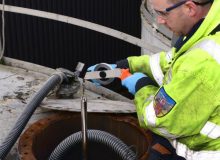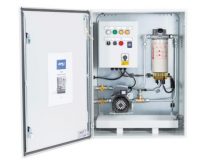Diesel Contamination
Diesel contamination is inevitable in the biodiesel blends we use today. If left untreated, contamination will cause problems for diesel-powered generators, vehicles and equipment.
On pages 8-17 of our Fuel Conditioning Handbook, we offer comprehensive advice on the dangers of diesel contamination, and what the main types and causes are. Click here to request your free copy
What is diesel contamination?
The diesel we buy in Europe is a blend of 93% petrochemical diesel and 7% biodiesel. Biodiesel – or FAME (Fatty Acid Methyl Ester) to give it its technical name – has been added to petrochemical diesel since 2011. This biodiesel blend contains less sulphur than pure petrochemical diesel and reduces CO2 emissions by up to 50%. However, the presence of biological organisms in diesel provides the ideal environment for contamination to occur.
Video: understanding fuel contamination
Our short video explains why diesel becomes contaminated and what happens if the issue is ignored.
Types of diesel contamination
As it gets older diesel suffers from 3 main types of contamination:
-
Water contamination
- Dissolved Water: water that is chemically dissolved or absorbed into water and distributed molecule by molecule. Think of sugar in tea.
- Emulsified Water: very small droplets of water are suspended in the diesel. Think of oil and vinegar in a salad dressing.
- Free Water: water that falls out of suspension in the diesel and gathers at the bottom of the tank. Whilst dissolved water can affect diesel’s stability, it is free and emulsified water that are more problematic. Not only can it cause fuel system and engine damage but it also promotes microbial growth (aka the diesel bug) in diesel storage systems.
-
Microbial growth (aka diesel bug).
- Microbial growth within a diesel storage tank is commonly known by the generic term ‘diesel bug’. Diesel bug isn’t a single type of organism. Up to 100 different types of bacteria, moulds and yeasts affect unprotected diesel systems.
- Bacteria: single cells, typically 1-10 micron in size, with a 20-30 minute generation time (i.e. the time it takes for the population to double). One cell can multiply into 2 million in 7 hours in warm temperatures. Bacteria will degrade diesel over time.
- Mould: a type of fungi with long multi-cellular filaments. There is little indication that they degrade diesel but due to the long strands are effective at blocking filters.
- Yeast: a different, slow-growing type of fungi. Yeasts are typically 3-4 micron in size.
- Biofilms: complex structures of microbes that adhere to the walls of the diesel storage tank. A biofilm begins to form when free-floating microbes land on a surface and attach themselves to it. This attachment is initially reversible. If they are not removed they start to change their structure and become irreversibly attached. These microbes then start to divide and attract other microbes to join the colony. Biofilms are complex structures that, given time, can grow to millimeters thick and contain billions of microbes. Sometimes, perhaps following tank turbulence, chunks of the biofilm will slough off and will block fuel filters. The bugs in biofilms also excrete acid. This acid will erode a metal fuel tank. Many holed tanks are a result of biofilm formation.

Contamination never used to be a serious problem. But since diesel was quietly blended with the biodiesel known as FAME, it has become an issue.
-
Solid particulate contamination
- Asphaltines: present in all petro-chemical diesel fuel to a greater or lesser extent. Their presence tends to increase with changes to diesel temperature and oxidation. They are hard, brittle particles that are not soluble in diesel. Asphaltines are generally less than 2 micron in size making them relatively harmless to a fuel injection system. However, they can agglomerate into larger particles which can easily block engine filters or damage injectors. These particles collect at the bottom of a fuel tank and can form an oily sludge that is often confused with microbial contamination.
- Gums and other Organic Contaminants: the oxidation stability of biodiesel is inferior to that of petro-chemical diesel. As the fuel comes into contact with oxygen, chemical reactions break down the diesel into peroxide, organic acids and gummy sediment. These soft, sticky substances can stick to fuel filters and engine components and cause acid erosion.
- Other Particles: such as road dust and grit, soot, fuel tank rust, engine wear particles. All particles, regardless of source have the potential to cause wear or damage to the fuel injection system or engine.
- Sludge: people talk about ‘sludge’ in diesel fuel systems and at the bottom of storage tanks. It is often interpreted as being one of the above contaminants. In reality, a combination of these contaminants merge to form sludge.
- Fuel testing – DieselCheck
- ClearTank tank cleaning
- Diesel Defence fuel polishing
How to identify diesel contamination.
There are several characteristics that may suggest you have a problem:
- You notice a rise in fuel consumption. Contaminated diesel does not generate as much power as clean fuel. Furthermore, the damage done to the engine by contaminated fuel (see below) reduces its mechanical efficiency.
- You see that engine’s power output is lower than usual or its revs are higher than usual. Both conditions suggest the engine has been partially damaged and/or that the fuel is not clean.
- You need to replace fuel filters more often than usual. Contaminated fuel contains more solid particulates and microbes. These clog filters and starve the engine of fuel.
- You need to clean fuel injectors more often. Injectors rarely need cleaning in normal operation. If your engine is losing power and poor injector performance is suspected, this could indicate that contamination is blocking the injectors. Cleaning injectors promptly is advisable. It is less expensive than replacing them later.
- You see heavy smoke from the exhaust. Contrary to its reputation, clean diesel produces clear exhaust emissions once the engine is warm. Smoke indicates something was not burnt during the combustion process. In cold engines, this can be excess diesel. In warm engines, it is more likely to be contaminants.
- Servicing reveals that piston rings and cylinder linings are pitted and worn. Contaminated fuel can damage engine parts through abrasion or acidic erosion.
- You notice an increase in oil consumption or oil contamination. Worn piston rings allow blow-by from the engine’s combustion chambers into its oil. Oil can also pass the other way. Fuel contamination is one of the reasons piston rings wear.
- Fuel testing reveals dark, opaque fuel. The simplest form of fuel testing is called the ‘clear and bright’ test, an elaborate way of saying “look at your fuel”. Clean diesel is clear and yellow (or red). Contaminated fuel is often dark. You might not be able to see through it. It may contain solid contaminants that are visible to the naked eye.
- Testing reveals a ‘rotten eggs’ smell. Clean diesel has a distinctive smell we all recognise. If you smell rotten eggs it indicates that the diesel contains decomposing microbial contaminants.
Any of these factors indicate that contaminated fuel threatens the reliability of your engine. They suggest that your engine is already partially failing. The contamination could cause a total failure if it is left untreated.
Why is contamination a problem?
Modern engines are incredibly sensitive to fuel contaminants. Engine filters can block and fuel injectors can suffer damage, resulting in total engine failure. This can have huge implications if the engine drives a generator providing emergency power to a hospital, data centre or bank.
Standby generators are a building’s last resort if mains power fails. They have to be 100% reliable. No backup strategy can accept the possibility of contaminated fuel derailing the power supply.
How to prevent diesel contamination.
The key to keeping your diesel clean and dry is a comprehensive fuel conditioning programme. This should include three steps:
You can enhance the effectiveness of the programme with products such as vent traps and normal fuel filters.
But rather than go to 4 or 5 different suppliers for these services IPU is a one-stop shop for fuel conditioning. We can provide you with a complete 3-step programme. Our short video explains the stages of the programme and how that can keep your diesel clean and dry.
Video: protecting yourself against fuel contamination
When it comes to fuel quality, prevention is always better than cure. IPU recommend you use effective processes to monitor and maintain optimum fuel condition wherever diesel or biodiesel is stored, . These don’t have to cost a fortune. Some of them don’t cost anything at all. It usually comes down to good fuel housekeeping.
Some of the measures to consider are:
- Purchase fuel from reliable sources.
- Keep all tanks well-maintained and leak-free.
- Keep your pipework in good condition. Even if your storage tanks are in a dry, protected area pipes are not so lucky. If harsh conditions affect your pipework consider using plastic pipes.
- Always follow recommended methods when refilling tanks.
- Where possible, keep fuel cool.
- Keep fuel tanks as full as possible to reduce water condensation from moisture-laden air.
- Filter fuel every time it is moved.
IPU DieselCheck
IPU’s DieselCheck fuel tests alert you to contamination caused by tainted deliveries or tank breaches.
A DieselCheck fuel test highlights the types and levels of contamination in your fuel. We then provide you with a simple report to explain what we found and importantly, how to treat it.
IPU ClearTank
IPU’s ClearTank cleaning service is a one-time process that prepares your fuel for long-term conditioning.
Cleaning is an important step that needs to take place before fuel polishing – just like you wouldn’t polish a dirty car. IPU’s ClearTank service simultaneously cleans both the fuel and the tank, leaving your fuel clean and dry.
IPU Diesel Defence
Unfortunately, clean fuel doesn’t stay clean for long. IPU’s Diesel Defence on-tank and mobile polishing units maintain fuel to EN590 and ISO 4406 standards, ensuring it’s ready to power your critical applications.
IPU Vent Traps
A storage tank’s breather vent is its weakest link. It is the easiest route for moisture the reach your diesel. At night, the air at the top of the tank cools and contracts. This draws fresh air into the tank through the breather. This new air brings moisture with it. Some of the moisture is absorbed into your diesel. After some of the air is expelled in the heat of the next day, the process repeats itself the following night.
IPU’s vent traps prevent moisture entering through the breather vents. Moisture is captured by the filter during the tank’s inhale cycle. During the exhale cycle air purges moisture from the filter back into the atmosphere. It is a self-maintaining system.
Parker Racor fuel filters
Parker Racor fuel filters are the gold-standard for on-application diesel filtration. IPU have been Racor distributors for over 30 years and can offer an unrivalled combination of expert service, competitive pricing and value-added services.



